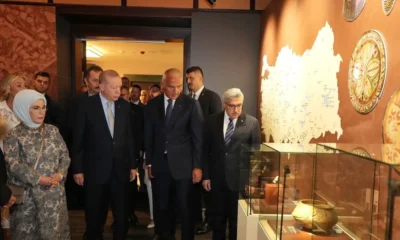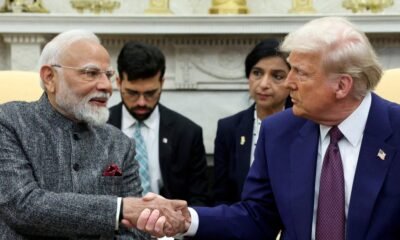Economy
Export surge reflects stronger Türkiye-Italy trade relations
Türkiye’s exports to Italy rose 7.5% in the first five months of 2025 compared to the same period last year, reaching $5.34 billion (TL 211.66 billion), according to official data, as bilateral trade between the two countries continues to steadily grow.
The rise comes amid broader efforts by Türkiye to strengthen trade ties with nearby countries, even as global economic uncertainty continues due to geopolitical tensions and protectionist policies.
Italy remains one of Türkiye’s top trade partners within the European Union, and recent diplomatic efforts have helped boost economic cooperation. In April, President Recep Tayyip Erdoğan and Italian Prime Minister Giorgia Meloni co-chaired the 4th Türkiye-Italy Intergovernmental Summit in Rome, where the two nations signed 11 new agreements spanning defense, energy, innovation, culture and transportation.
“Türkiye and Italy are two strong allies navigating a period where global and regional developments are pushing us toward closer cooperation,” Erdoğan said following the summit. He noted that partnerships in the defense sector would continue to expand.
According to the Turkish Exporters Assembly (TIM), exports to Italy in May alone reached $1.14 billion, an 8% increase year-over-year. Italy accounted for 4.8% of Türkiye’s total exports from January through May, which totaled $110.95 billion, up 3.5% from the same period last year.
The automotive industry led Turkish exports to Italy, bringing in $1.3 billion. Other top sectors included chemicals at $777 million, ferrous and non-ferrous metals at $472.5 million, steel at $456.1 million and textiles at $327 million.
While automotive and textile exports saw slight annual declines of 5.6% and 1.8%, respectively, chemicals rose 14.6%, metals jumped 37.4% and steel grew 9.4%.
Istanbul was the top exporting province to Italy, accounting for $1.8 billion in shipments. Kocaeli followed with $727.4 million, Bursa with $514.6 million, Izmir with $327.2 million and Ankara with $208.2 million.
In an interview on Tuesday, Stefano Kaslowski, president of the Italian Chamber of Commerce and Industry in Türkiye (CCIIST), said the figures reflect the strength and potential of commercial ties between the two countries.
“This success is not a coincidence but a result of deep-rooted, long-standing relations,” Kaslowski told Anadolu Agency (AA). “We’ve been bringing the Turkish and Italian business communities together since 1885.”
Kaslowski noted that more than 1,500 Italian companies operate in Italy with commercial ties to Türkiye, and many have strong investment footprints in the country. He said Italy’s role as Türkiye’s second-largest EU trade partner highlights its strategic importance.
The bilateral trade volume reached $28 billion in 2023, and both countries are aiming to exceed $40 billion in the coming years, according to Kaslowski.
He said the growing trade figures suggest not just numerical growth, but a “structural transformation,” driven by improving Turkish quality standards, better alignment with Italian market needs, and logistics improvements.
Kaslowski emphasized that Italy’s industrial strength in sectors such as machinery, pharmaceuticals, automotive and luxury goods, coupled with its push toward green and digital transformation, creates significant opportunities for Turkish businesses.
Likewise, Türkiye’s young population, production capacity and geographic location make it an attractive destination for Italian investors, he said. He also underlined the importance of modernizing the EU-Türkiye Customs Union to facilitate further trade.
As part of its role, CCIIST provides services including business matchmaking, trade fair coordination, market research and advisory support for new ventures. The organization also arranges bilateral delegations, seminars, and networking events.
Recent CCIIST events, such as the “Risks and Opportunities in Türkiye-Italy Foreign Trade” roundtable, brought together sector experts and officials to find practical solutions to common trade challenges, such as customs optimization and cost reduction.
Kaslowski expressed optimism about the future, especially in areas like sustainability, digital transformation and green technologies.
“If the current trend continues, we expect exports to Italy to reach $12 billion-13 billion by year-end,” he said. “But our goal isn’t just to grow in numbers – we aim to develop high-value, technology-intensive and sustainable trade relationships.”
He added that deeper cooperation between businesses, support for joint R&D and investment in new-generation entrepreneurs would be key to achieving that vision.
Economy
Türkiye’s export outlook remains robust despite global uncertainty
The export climate for Turkish manufacturers remained strong in July as demand conditions continued to improve in their top markets despite uncertainty in global trade, a survey showed on Friday.
The Manufacturing Export Climate Index, which tracks the performance of Türkiye’s key export markets, rose to 51.3 from 51.0 in June, the Istanbul Chamber of Industry (ISO) said.
Readings above the neutral 50 threshold indicate an improvement in the export climate, while values below suggest deterioration. The latest figure marks the 19th consecutive month of improvement.
Economic activity in the United States, Türkiye’s second-largest export market for manufactured goods, accelerated in July, expanding at its fastest pace so far in 2025, the survey said.
The Middle East also contributed, with the United Arab Emirates (UAE) seeing strong non-oil activity despite a slight slowdown from June. Similar trends were recorded in Saudi Arabia and Kuwait.
Several major European export markets also registered growth in output. Spain recorded strong expansion, while Germany, the U.K., Italy and the Netherlands saw moderate increases.
In contrast, output contracted in France and Romania, which together account for about 7% of Türkiye’s manufacturing exports.
Russia’s output fell for a second month in July, with the pace of decline accelerating to its sharpest since October 2022, according to the survey.
Among all monitored economies, India posted the fastest growth, accelerating to a 15-month high. The steepest contraction occurred in Taiwan, followed by notable declines in Poland and Kenya.
Commenting on the findings, Andrew Harker, economics director at S&P Global Market Intelligence, said:
“In July, demand conditions showed improvement in most of the top 10 export markets of Turkish manufacturers. The notable expansion in the United States, where growth was recorded at its fastest pace since the beginning of 2025, was particularly encouraging for firms,” said said Andrew Harker, economics director at S&P Global Market Intelligence.
“In a global trade environment marked by heightened uncertainties, the overall improvement in economic activity in countries that constitute the main sources of external demand for Turkish exporters is a positive signal.”
Economy
Türkiye on verge of ending FX-protected deposit scheme
Türkiye is nearing an exit from a scheme shielding deposits against currency depreciation, a measure authorities began phasing out gradually in 2023 following a pivot toward more conventional economic policies.
Officials and the central bank have said the foreign exchange-protected Turkish lira deposits scheme, known as KKM, would be terminated by the end of 2025, though many bankers believe the exit could come even sooner.
Under the scheme, adopted in late 2021 to help reverse dollarization and counter a steep fall in lira, the Central Bank of the Republic of Türkiye (CBRT) had been protecting deposits by covering depreciation costs.
But authorities have been seeking to phase it out gradually and transition deposits into regular lira accounts, in part by dissuading companies and individuals from renewing the KKM accounts.
The value of deposits covered by the scheme has shrunk from a peak of $140 billion to below $11.8 billion, a figure now seen as negligible in the context of Türkiye’s $1.3 trillion economy. The exit from KKM has progressed much faster than initial market expectations.
Under the scheme, individuals and businesses were able to deposit lira in special accounts that were protected against exchange rate losses. The lira lost 44% of its value against the dollar in 2021, 29% in 2022, 37% in 2023, and 16% last year.
So far this year, it has depreciated by 13%.
Treasury and Finance Minister Mehmet Şimşek told Reuters this week the KKM balance had declined steadily thanks to the government’s exit strategy and tight monetary policy.
The KKM stock has fallen to almost TL 478 billion ($11.75 billion) from TL 3.4 trillion in August 2023. Its share of total deposits slid to 2% from 26.2%.
The balance dropped around TL 11.6 billion in the week through Aug. 1, according to the data from the Banking Regulation and Supervision Agency (BDDK) on Thursday.
After May 2023 elections, authorities turned to more conventional policies led by monetary tightening primarily aimed at curbing stubborn inflation.
With inflation having eased to 33.5% from a peak of 75% last year, the central bank has begun cutting rates again.
The total cost of the KKM is estimated at nearly $60 billion to the end of 2024, according to Reuters calculations based on central bank reports and budget data.
Last year, Türkiye ended other such policies, including a rule that forced banks to buy government bonds, effectively ending state control over the bond market. Earlier this year, the opening and renewal of KKM accounts for corporates was halted.
Since the return on KKM accounts is capped at 40% of the policy rate, they have long ceased to offer a meaningful alternative to regular lira deposits.
As the remaining KKM accounts held by individuals mature, a final regulation is expected to prohibit new openings and renewals, completing the phase-out of the scheme.
Economy
Global food prices hit 2-year high on rising meat, edible oils
Global food commodity prices climbed in July to their highest level in more than two years, driven by surging vegetable oil costs and record-high meat prices, which offset declines in cereals, dairy and sugar, data showed on Friday.
The United Nations’ Food and Agriculture Organization (FAO) Food Price Index, which serves as a global benchmark for food commodity prices, averaged 130.1 points in July, a 1.6% increase from June, FAO said.
That was the highest reading since February 2023, though the index was 18.8% below its peak of March 2022, which followed Russia’s full-scale invasion of Ukraine.
FAO’s meat price index hit a new all-time high of 127.3 points, up 1.2% from its previous peak in June, as strong import demand from China and the United States boosted beef and sheep meat prices, the agency said.
U.S. beef imports have climbed after drought led to a decline in the domestic cattle herd. China shipped in record amounts of beef last year amid growing popularity of the meat, though an official probe into imported beef has raised uncertainty about Chinese demand.
In other meat markets, poultry prices rose slightly following the resumption of imports of Brazilian chicken by major buyers after Brazil regained its avian influenza-free status following action against a first farm-level outbreak.
In contrast, pig meat prices declined due to sufficient supplies and lower demand, particularly in the European Union, FAO added.
The agency’s vegetable oil index surged to 166.8 points, up 7.1% month-on-month and the highest level in three years.
This increase was driven by higher quotations for palm, soy, and sunflower oils due to robust global demand and tightening supplies, though rapeseed oil prices fell as new-crop supplies arrived in Europe, FAO said.
FAO’s cereal price benchmark eased to its lowest in almost five years, reflecting seasonal supply pressure from wheat harvests in the Northern Hemisphere.
Its separate rice index dropped 1.8% last month, driven by ample export supplies and weak import demand.
Dairy prices edged down for the first time since April 2024, with declines for butter and milk powders offsetting further gains for cheese.
FAO’s sugar price index eased for a fifth consecutive month on expectations of increased production in Brazil and India, despite indications of recovering global sugar import demand, the agency said.
FAO did not update its cereal supply and demand estimates this month.
Economy
Trump nominates top economic aide Stephen Miran for vacant Fed seat
U.S. President Donald Trump said Thursday he will nominate a top economic adviser to the Federal Reserve’s Board of Governors, temporarily filling a vacancy as he seeks to boost his sway over the independent central bank.
Trump said he has named Stephen Miran, the chair of the White House’s Council of Economic Advisers, to fill a seat vacated by Governor Adriana Kugler, a former President Joe Biden appointee who is stepping down Friday.
Kugler announced a surprise resignation last week, as she returns to her tenured professorship at Georgetown University.
Miran, if approved by the Senate, will serve until Jan. 31, 2026.
Trump said the White House continues to search for a permanent replacement to serve in the 14-year Fed Board seat that opens Feb. 1.
The appointment is Trump’s first opportunity to exert more control over the Fed, one of the few remaining independent federal agencies. Trump has relentlessly criticized the current chair, Jerome Powell, for keeping short-term interest rates unchanged, calling him “a stubborn MORON” last week on social media.
Miran has advocated for a far-reaching overhaul of Fed governance that would include shortening Board member terms, putting them under the clear control of the president, and ending the “revolving door” between the executive branch and the Fed.
He has also been a major defender of Trump’s income tax cuts and tariff hikes, arguing that the combination will generate enough economic growth to reduce budget deficits.
Miran, who obtained a PhD in economics from Harvard, also has played down the risk of Trump’s tariffs generating higher inflation, a major source of concern for Powell.
His 41-page essay titled “A User’s Guide to Restructuring the Global Trading System” has been seen as providing rationale for Trump’s aggressive trade policies.
The choice of Miran may heighten concerns about political influence over the Fed, which has traditionally been insulated from day-to-day politics.
Fed independence is generally seen as key to ensuring that it can take difficult steps to combat inflation, such as raising interest rates, that politicians might be unwilling to take.
Federal Reserve governors vote on all the central bank’s interest-rate decisions, as well as its financial regulatory policies.
Miran’s nomination, if approved, would add a near-certain vote in support of lower interest rates.
At its most recent meeting last week, Fed officials kept their key rate unchanged at 4.3%, where it has stood after three rate cuts late last year. But two Fed governors – Christopher Waller and Michelle Bowman – dissented from that decision. Both were appointed by Trump in his first term.
Still, even with Miran on the board, 12 Fed officials vote on rate policy and many remain concerned that Trump’s sweeping tariffs could push inflation higher in the coming months.
After the July jobs report was released last Friday, Miran criticized Powell for not cutting rates, saying that Trump had been proven correct on inflation during his first term and would be again.
The president has pressured Powell to cut rates under the belief that his tariffs will not fuel higher inflationary pressures.
“What we’re seeing now in real time is a repetition once again of this pattern where the president will end up having been proven right,” Miran said on MSNBC.
“And the Fed will, with a lag and probably quite too late, eventually catch up to the president’s view.”
Trump said Miran would do an “outstanding” job in his new post.
“Has been with me from the beginning of my Second Term, and his expertise in the World of Economics is unparalleled,” Trump wrote on Truth Social. “Congratulations Stephen!”
Economy
Trump team reportedly favors Christopher Waller as Fed chair pick
Federal Reserve (Fed) Governor Christopher Waller is emerging as a top candidate to be the U.S. central bank’s next chair, a report said on Thursday, citing people familiar with the matter.
Waller has met with members of President Donald Trump’s team, who are impressed with him, though he has not met with the president, Bloomberg News reported. A Fed spokesperson had no comment.
“President Trump will continue to nominate the most competent and experienced individuals to deliver on his pledge to Make America Wealthy Again,” White House spokesperson Kush Desai said.
“Unless it comes from President Trump himself, however, any discussion about personnel decisions should be regarded as pure speculation.”
Trump has repeatedly criticized Fed Chair Jerome Powell for not cutting interest rates, and while he has backed off threats to try to oust Powell before his term ends on May 15, has accelerated the search for a replacement.
Trump’s pick will be closely scrutinized for a perceived ability to carry out monetary policy without ceding to political pressure, a quality that economists say is the bedrock of any central bank’s inflation-fighting capabilities and what underpins the financial stability of the U.S. economy.
Powell has not said if he would break with tradition and stay on as Fed governor after his chair term ends, though analysts speculate that if he felt the Fed’s independence was under threat, he would do so to deny Trump the chance to fill another open Fed seat.
Waller, a PhD economist whose first speech after becoming Fed governor was about the central bank’s independence, could allay those concerns.
Waller wanted an interest-rate cut at the Fed’s July meeting, and dissented along with fellow Trump appointee Fed Vice Chair Michelle Bowman when the majority decided to leave short-term borrowing costs unchanged.
While Trump has called for lower rates in order to reduce the cost of government borrowing, Waller has built his case for lower rates on the argument that tariffs won’t boost inflation and that a slowing labor market needs the support of easier policy.
He has rejected the idea that rate-setting should have anything to do with making financing cheaper for the U.S. Treasury.
White House economic advisor Kevin Hassett and former Fed Governor Kevin Warsh, both of whom have also expressed support for cutting interest rates, remain under consideration for the Fed chair job as well, Bloomberg News said.
Trump on Wednesday said both men and an unnamed third person are candidates to fill a soon-to-be-open seat on the Fed board vacated by Governor Adriana Kugler, whose unexpired term runs through January.
Economy
Chinese shippers defy tensions as exports top expectations in July
China’s exports exceeded forecasts in July, as manufacturers capitalized on a fragile tariff truce between Beijing and Washington to ship goods, particularly to Southeast Asia, ahead of tougher U.S. duties targeting transshipment.
Global traders and investors are waiting to see whether the world’s two largest economies can agree on a durable trade deal by Aug. 12 or if global supply chains will again be upended by the return of import levies exceeding 100%.
U.S. President Donald Trump is pursuing further tariffs, including a 40% duty on goods rerouted to the U.S. via transit hubs that took effect on Thursday, as well as a 100% levy on chips and pharmaceutical products and an additional 25% tax on goods from countries that buy Russian oil.
China’s exports rose 7.2% year-on-year in July, customs data showed on Thursday, beating a forecast 5.4% increase in a Reuters poll and accelerating from June’s 5.8% growth.
Imports grew 4.1%, defying economists’ expectations for a 1.0% fall and climbing from a 1.1% rise in June.
China’s trade war truce with the U.S. – the world’s largest consumer market – ends next week, although Trump hinted that further tariffs may be imposed on Beijing due to its continued purchases of Russian hydrocarbons.
“The trade data suggests that the Southeast Asian markets play an ever more important role in U.S.-China trade,” said Xu Tianchen, senior economist at The Economist Intelligence Unit.
“I have no doubt Trump’s transshipment tariffs are aimed at China, since it was already an issue during Trump 1.0. China is the only country for which transshipment makes sense, because it still enjoys a production cost advantage and is still subject to materially higher U.S. tariffs than other countries,” he added.
China’s exports to the U.S. fell 21.67% last month compared to the same period a year earlier, according to the data, while shipments to the Association of Southeast Asian Nations (ASEAN) rose 16.59% over the same period.
The levies are bad news for many U.S. trading partners, including the emerging markets in China’s periphery that have been buying raw materials and components from the regional giant and furnishing them into finished products as they seek to move up the value chain.
China’s July trade surplus narrowed to $98.24 billion from $114.77 billion in June. Separate U.S. data released on Tuesday showed that the trade deficit with China shrank to its lowest level in more than 21 years in June.
Despite the tariffs, markets showed optimism for a breakthrough between the two superpowers, with China and Hong Kong stocks rising in morning trade. Trump indicated earlier this week that he might meet Chinese President Xi Jinping later this year if a trade deal was reached.
Trade uncertainty
China’s commodities imports painted a mixed picture, with soybean purchases hitting record highs in July, driven by bulk buying from Brazil while avoiding U.S. cargoes. Analysts, however, cautioned that inventory building may have skewed the import figures, masking weaker underlying domestic demand.
“While import growth surprised on the upside in July, this may reflect inventory building for certain commodities,” said Zichun Huang, China economist at Capital Economics, pointing to similarly strong purchases of crude oil and copper.
“There was less improvement in imports of other products and shipments of iron ore continued to cool, likely reflecting the ongoing loss of momentum in the construction sector,” she added.
A protracted slowdown in China’s property sector continues to weigh on construction and broader domestic demand, as real estate remains a key store of household wealth.
Chinese government advisers are stepping up calls to make the household sector’s contribution to broader economic growth a top priority at Beijing’s upcoming five-year policy plan, as trade tensions and deflation threaten the outlook.
Reaching an agreement with the U.S. and the European Union, which have accused China of producing and selling goods at too low a price, would give Chinese officials more room to advance their reform agenda.
However, analysts expect little relief from Western trade pressures. Export growth is projected to slow sharply in the second half of the year, hurt by persistently high tariffs, President Trump’s renewed crackdown on the rerouting of Chinese shipments and deteriorating relations with the EU.
-

 Politics3 days ago
Politics3 days agoTurkish govt reinstates CHP mayor arrested on corruption charges
-

 Economy3 days ago
Economy3 days agoPublic land formula essential for transformation
-

 Daily Agenda2 days ago
Daily Agenda2 days ago‘There is a systematic industry behind Islamophobia’
-

 Sports3 days ago
Sports3 days agoRising Turkish amputee footballers eye 1st team glory in heat
-

 Politics3 days ago
Politics3 days agoYPG terrorist leader insists on decentralized Syria, name change
-

 Daily Agenda3 days ago
Daily Agenda3 days agoThe summit of archeology is in Beştepe: 12 thousand years of memory of Anatolia is exhibited at the house of the nation
-

 Daily Agenda3 days ago
Daily Agenda3 days agoAK Party, 81 provinces landing in the field: ‘Türkiye Century Meetings’ begins!
-

 Economy3 days ago
Economy3 days agoTrump to add another 25% tariff on India over Russian oil purchases




